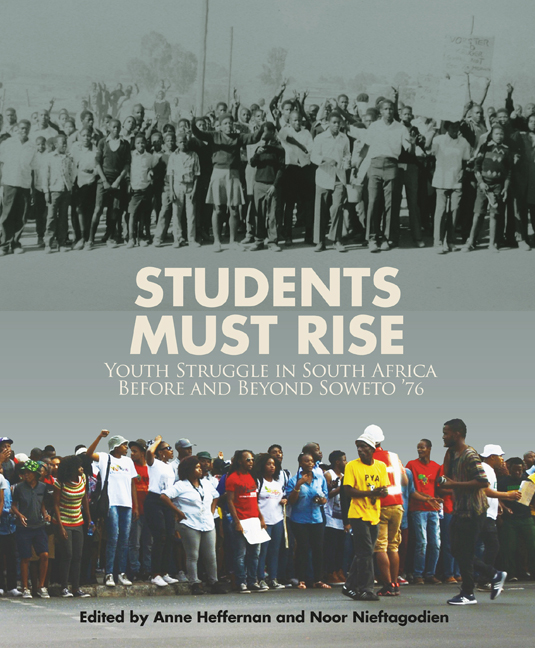Book contents
- Frontmatter
- Acknowledgements
- Contents
- Timeline
- Map Of South Africa
- Glossary
- Abbreviations
- Introduction: narratives of the student struggle
- Chapter 1 A brief history of the African Students’ Association
- Chapter 2 Youth and student culture: Riding resistance and imagining the future
- Chapter 3 The role of religion and theology in the organisation of student activists
- Chapter 4 Student organisation in Lehurutshe and the impact of Onkgopotse Abram Tiro
- Chapter 5 The University of the North: A regional and national centre of activism
- Chapter 6 Action and fire in Soweto, June 1976
- Chapter 7 What they shot in Alex
- Chapter 8 SASO and Black Consciousness, and the shift to congress politics
- Chapter 9 Youth politics and rural rebellion in Zebediela and other parts of the “homeland” of Lebowa, 1976–1977
- Chapter 10 My Journey, our journey: Activism at Ongoye University
- Chapter 11 ‘Let's begin to participate fully now in politics’: Student politics, Mhluzi township, 1970s
- Chapter 12 ‘They would remind you of 1960’: The emergence of radical student politics in the Vaal Triangle, 1972–1985
- Chapter 13 The ends of boycott
- Chapter 14 Fighting for ‘our little freedoms’: The evolution of student and youth politics in Phomolong township, Free State
- Chapter 15 ‘Every generation has its struggle’: A brief history of Equal Education, 2008–15
- Chapter 16 Contemporary student politics in South Africa: The rise of the black-led student movements of #RhodesMustFall and #FeesMustFall in 2015
- Selected Bibliography
Introduction: narratives of the student struggle
Published online by Cambridge University Press: 21 April 2018
- Frontmatter
- Acknowledgements
- Contents
- Timeline
- Map Of South Africa
- Glossary
- Abbreviations
- Introduction: narratives of the student struggle
- Chapter 1 A brief history of the African Students’ Association
- Chapter 2 Youth and student culture: Riding resistance and imagining the future
- Chapter 3 The role of religion and theology in the organisation of student activists
- Chapter 4 Student organisation in Lehurutshe and the impact of Onkgopotse Abram Tiro
- Chapter 5 The University of the North: A regional and national centre of activism
- Chapter 6 Action and fire in Soweto, June 1976
- Chapter 7 What they shot in Alex
- Chapter 8 SASO and Black Consciousness, and the shift to congress politics
- Chapter 9 Youth politics and rural rebellion in Zebediela and other parts of the “homeland” of Lebowa, 1976–1977
- Chapter 10 My Journey, our journey: Activism at Ongoye University
- Chapter 11 ‘Let's begin to participate fully now in politics’: Student politics, Mhluzi township, 1970s
- Chapter 12 ‘They would remind you of 1960’: The emergence of radical student politics in the Vaal Triangle, 1972–1985
- Chapter 13 The ends of boycott
- Chapter 14 Fighting for ‘our little freedoms’: The evolution of student and youth politics in Phomolong township, Free State
- Chapter 15 ‘Every generation has its struggle’: A brief history of Equal Education, 2008–15
- Chapter 16 Contemporary student politics in South Africa: The rise of the black-led student movements of #RhodesMustFall and #FeesMustFall in 2015
- Selected Bibliography
Summary
The Soweto Uprising of 1976 was a decisive turning point in the struggle against apartheid. In the morning of June 16 thousands of students marched peacefully through the streets of Soweto to demand the scrapping of Afrikaans as a medium of instruction. By the afternoon those students were fighting “the system” – apartheid – as they confronted the armed forces of the state. In so doing, black students, whose numbers had increased significantly since the early 1970s, were fundamentally changing the country's political landscape. Since that time students have held a special place in the collective imaginary of South African history. The historic occasion in 2016 of the fortieth anniversary of the Soweto Uprising provides an opportunity to engage with this imagining, to contribute to the public debate around the roles that black students play in the politics of their country, and to raise certain questions about the way their history has been framed. June 16 has gained even greater significance due to the #FeesMustFall movement of 2015 that once again brought into sharp relief the power of black students. In fact, the “born frees” have consciously connected their current struggles for free and quality education to the struggles of the 1976 generation.
This volume is a collaboration between the History Workshop (University of the Witwatersrand) and SOMAFCO (Solomon Mahlangu Freedom College) Trust. In the midst of the #FeesMustFall struggles both organisations recognised the need to introduce histories of student movements into the national conversations about the nature of contemporary student protests. The chapters here draw on existing work by leading scholars in the field, many of whom were and are student activists in their own rights. They seek to bring some of the most current academic debates over the role of student mobilisation, ideology, strategy, and tactics to a broad public audience. The scope of time and varied geographic locations addressed in this volume intentionally try to amend a narrative that has placed Soweto 1976 at the centre of discussions on student and youth activism in South Africa and to contextualise that moment with reference to the many forms of activism that have taken place in other locations and institutions over the last sixty years.
- Type
- Chapter
- Information
- Students Must RiseYouth struggle in South Africa before and beyond Soweto ’76, pp. 1 - 5Publisher: Wits University PressPrint publication year: 2016



